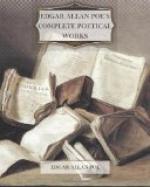Pol. It is most true—
All
this is very true. When saw you, sir,
When
saw you now, Baldazzar, in the frigid
Ungenial
Britain which we left so lately,
A
heaven so calm as this—so utterly free
From
the evil taint of clouds?—and he did say?
Bal. No more, my lord, than
I have told you:
The
Count Castiglione will not fight.
Having
no cause for quarrel.
Pol. Now this is true—
All
very true. Thou art my friend, Baldazzar,
And
I have not forgotten it—thou’lt do
me
A
piece of service: wilt thou go back and say
Unto
this man, that I, the Earl of Leicester,
Hold
him a villain?—thus much, I pr’ythee,
say
Unto
the Count—it is exceeding just
He
should have cause for quarrel.
Bal. My lord!—my friend!—
Pol. (aside). ’Tis he—he
comes himself!
(aloud.)
Thou reasonest well.
I
know what thou wouldst say—not send the
message—
Well!—I
will think of it—I will not send it.
Now
pr’ythee, leave me—hither doth come
a person
With
whom affairs of a most private nature
I
would adjust.
Bal. I go—to-morrow
we meet,
Do
we not?—at the Vatican.
Pol. At the Vatican.
(Exit Bal.)
Enter Castiglione.
Cas. The Earl of Leicester here!
Pol. I am the Earl of
Leicester, and thou seest,
Dost
thou not, that I am here?
Cas. My lord, some strange,
Some
singular mistake—misunderstanding—
Hath
without doubt arisen: thou hast been urged
Thereby,
in heat of anger, to address
Some
words most unaccountable, in writing,
To
me, Castiglione; the bearer being
Baldazzar,
Duke of Surrey. I am aware
Of
nothing which might warrant thee in this thing,
Having
given thee no offence. Ha!—am I right?
’Twas
a mistake?—undoubtedly—we all
Do
err at times.
Pol. Draw, villain, and prate no more!
Cas. Ha!—draw?—and
villain? have at thee then at once,
Proud
Earl!
(Draws.)
Pol.
(drawing.) Thus to the expiatory tomb,
Untimely
sepulchre, I do devote thee
In
the name of Lalage!




